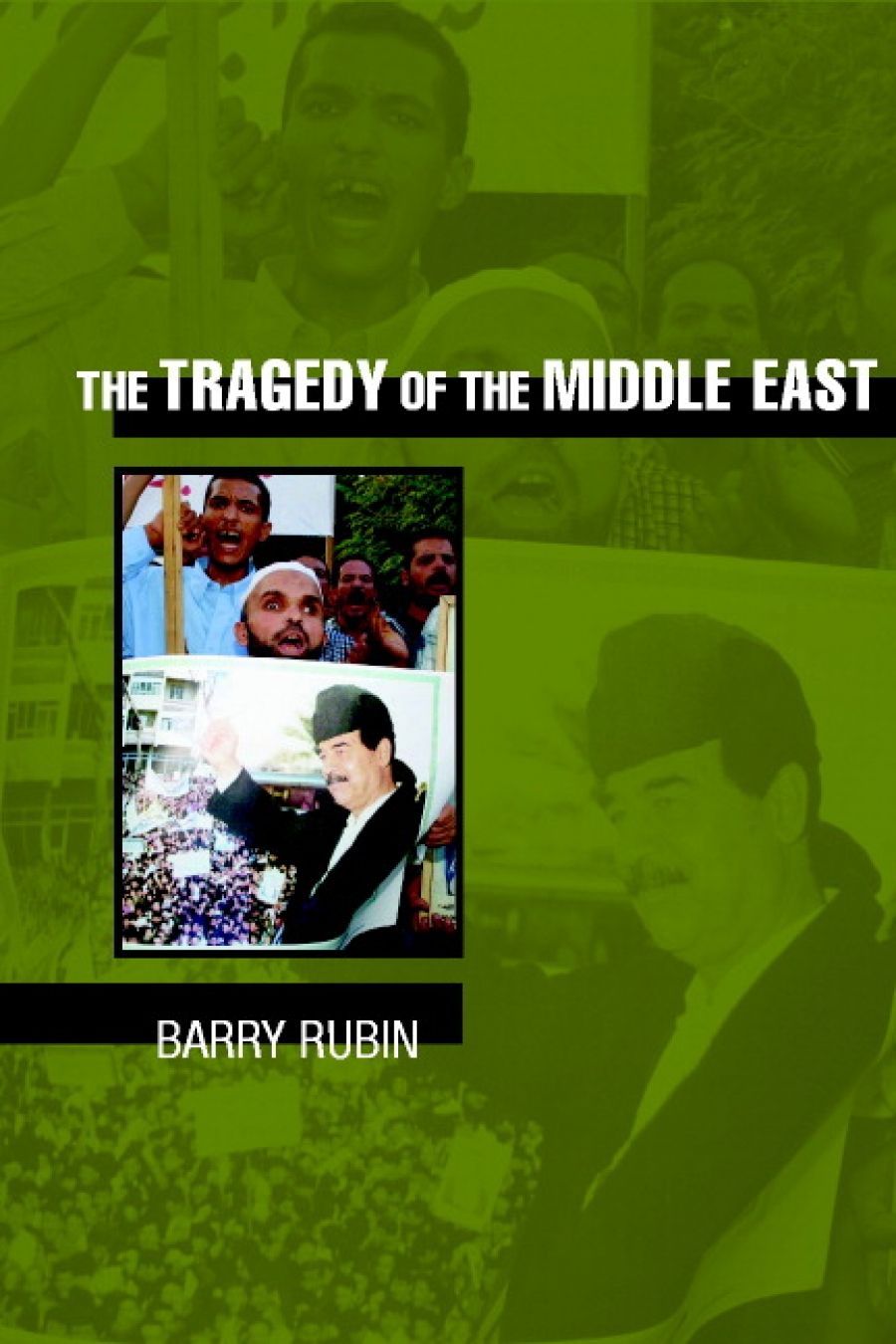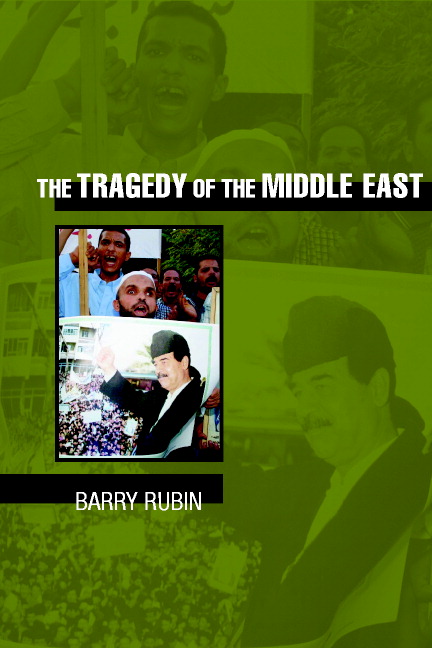
- Free Article: No
- Contents Category: International Studies
- Review Article: Yes
- Article Title: Blame it on Uncle Sam
- Online Only: No
- Custom Highlight Text:
Why is the Middle East anti-American? That is the core question in Barry Rubin’s flowing account of contemporary politics in that turbulent region of the world. As the director of Global Research in International Affairs in Israel, with a long history of research and publication on the Middle East and US foreign policy towards the region, Rubin is confident of his assessment. He is a prolific writer with some forty books to his name. The present one, The Tragedy of the Middle East, appears to comprise reflections based partly on the collection of media-excerpts and publications by Islamic groups in the wake of the September 11 attacks, published separately as an edited volume, Anti-American Terrorism and the Middle East (2002), although there is no acknowledgment in this book of such a link. The theme of anti-Americanism has also provided the material for a more recent book by Rubin titled Hating America: A History (2004).
- Book 1 Title: The Tragedy of the Middle East
- Book 1 Biblio: CUP, $49.95 pb, 287 pp
- Book 1 Cover Small (400 x 600):

- Book 1 Cover (800 x 1200):

So how does Rubin answer that simple, yet perplexing question? If Rubin is to be believed, anti-Americanism offers something for everyone, hence its wide appeal. For the élite in the Arab Middle East and Iran, the US offers an easy external target to divert popular resentment and anger at the entrenched corruption and mismanagement of the state machineries. The national élites stoke the fire of anti-Americanism and blame the US for national and regional shortcoming because, if they don’t, they have to take the blame. According to this analysis, this is a simple case of blame it on Uncle Sam. Rubin argues that, by virtue of state control over the media and freedom of speech, the Arab and Iranian élite has managed to set the parameters of public discourse, giving a green light explicitly or implicitly to political expressions that target the US.
Given this scenario, it is not surprising to Rubin that Arab and Iranian intellectuals, and various NGOs, save their harshest criticism for the US and Israel. Adopting the discourse of anti-Americanism becomes a determining factor in whether or not political activists can continue to function in their chosen environment; in some cases, it could even be an existential issue. As a consequence, Rubin argues, the masses take the anti-American rhetoric at face value and internalise it. The only current political force in the Middle East that may be expected to act independently of the ruling élites is Islamic radicalism. But on anti-Americanism, Islamic radicals and ruling élites speak with one voice and rely on the entrenched social antipathy towards the US to gain popular appeal. According to Rubin, this relationship is sustained by the vested interests of all parties and is likely to continue for the foreseeable future. In other words, the Arab Middle East and Iran are engaged in an extensive, long-term mass delusion.
Anticipating the inevitable criticism of his analysis, Rubin devotes a chapter to US policy towards the Middle East to demonstrate the fallacy of the Middle Eastern perspective. Except for the US–Israel alliance, Rubin finds no major cause for anti-American grievance. The US, Rubin contends, has consistently acted in favour of Muslims, be it in Afghanistan against Soviet aggression, in Iraq against Iran’s Islamic radicalism, in Kuwait against Saddam Hussein’s invasion, or in Bosnia against Serbian repression. Instead, Rubin criticises the US for being too soft on its opponents and for allowing its long-time allies (for example, the Shah of Iran) to be deposed by popular uprisings. The US efforts to make amends with the Muslim world, he argues, are misconstrued as weakness in the Middle East. This has undermined the power and determination of the US in the eyes of Osama bin Laden and his ilk, a major factor behind the current wave of terrorism.
This assessment has obvious appeal in its singular logic. Some members of the neo-conservative camp would embrace this assessment and reject ‘appeasement’ strategies in favour of resolute action. Régime change in the Middle East has now entered official discourse in Washington, no doubt to the delight of Rubin, who in 2002 was imploring the US to take action against Saddam Hussein. But it is unlikely that other readers would find this assessment of anti-Americanism in the Middle East convincing. Rubin deliberately overlooks or mitigates some key factors that have, in the past, had a direct bearing on US policy-making, namely the Cold War bipolarity which led Washington to the Afghan hills; or its fear of the spread of Islamic radicalism and the potential for popularly-led ‘régime change’ in the Middle East which entrenched it in the Iran–Iraq war; or anxiety over the flow of oil and the consequent impact on the global economy, which led the US into a major war with Iraq. Some Muslims have, of course, benefited from some of these policies. But it is grossly misleading to suggest that the US has behaved in the manner it has with the interest of the Muslim world at heart.
Rubin even argues that the same misconceived anti-American notions are responsible for the lack of progress in the Palestinian–Israeli dispute, and echoes Ariel Sharon and George W. Bush in accusing Yasser Arafat of terrorism. This is simplistic beyond imagination.
Rubin’s account of the Middle East is overflowing with unsubstantiated generalisations, clustering diverse political groups under the catch-all rubric of anti-Americanism with corrupt régimes at the helm. This is an insult to the many public intellectuals in the Middle East who work towards an independent civil society in very difficult conditions, and to those living in Europe, North America and Australia. Rubin’s preference for an over-generalised account is reflected in the absence of any reference to the large body of literature that could contradict his analysis. As a consequence, The Tragedy of the Middle East has turned into a parody of sloppy and one-sided scholarship.


Comments powered by CComment